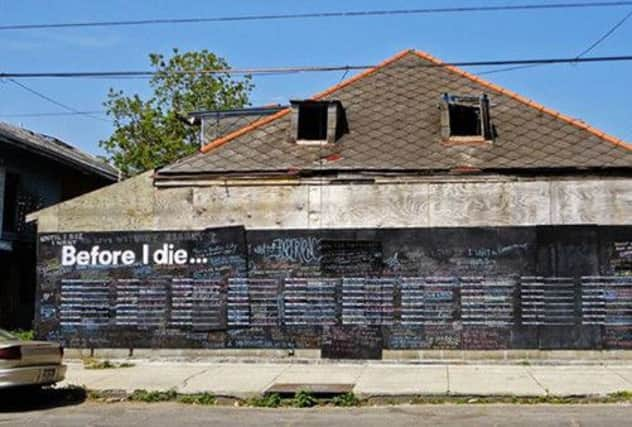It’s life-affirming to talk about death


That’s exactly why The 100% Project was created – a community engagement project which aims to start conversations about death, dying and bereavement in a life-affirming way. It has been developed by Children’s Hospice Association Scotland (CHAS) in response to families who have experienced the death of a child telling us of their feeling of isolation due to society’s discomfort in talking about their loss.
CHAS is there to support families before and after bereavement. This includes starting conversations which might make people less likely, as one mum put it, “to cross the street rather than acknowledge that my child had died”.
Advertisement
Hide AdAdvertisement
Hide AdSo how do we start these conversations? Rather than walk up to people and say, “So, what do you think about death?” we decided to take a more creative approach in the hope of engaging more people in a number of ways.
In May, we adopted the Before I Die Walls. Inspired by American artist Candy Chang who, after someone she loved died, painted the side of an abandoned building in her New Orleans neighbourhood with chalkboard paint and stencilled the words, “Before I die I want to ____”, inviting people to add their own aspirational words. Since then versions of these walls have appeared in more than 50 countries and 20 languages, like a bucket list for the world. Now Scotland has joined in the conversation.
Over the summer we also launched the 100% Book Club, intended for an adult readership but featuring books aimed at children and young adults. Children’s books often deal directly with death and dying, using fewer words to greater effect. If children can read these books and cope with the subject matter, surely as adults we can too?
The 100% Blog has provided another public channel for people to write their very personal thoughts around death and dying. Many of them have shared thoughts on living life more fully by accepting, rather than denying, their own mortality. Each of them has begun a whole new conversation. Many of these dialogues happen more privately, but they are happening nonetheless.
During the 2013 Edinburgh Festival Fringe, in partnership with Good Life, Good Death, Good Grief, The 100% Project ran Scotland’s first “Death Cafés”, called Dining with Death.
Death Cafés are another international project which encourage people to drink, eat and discuss death. The Death Cafés help us think about how we may want to prepare for death, which in other countries and cultures is an accepted part of life, and people are preparing for it day in, day out. Each table has a “conversation menu” and with each conversation course, different refreshments are served. The recent menu included “Many people write a birth plan. What would be in your death plan?”, “How do you think Scotland would take to a Mexican day of the Dead?” and “How would you like to be remembered?”
Throughout all of this, some incredible conversations have already taken place. People have shared their personal experiences of both life and death. In every one of these interactions has been a brief and uniquely human connection which has often been humbling to take part in.
You can hear a person speak about someone they love and miss desperately, and know there is a comfort in proudly saying their name out loud. You can hear someone explain to their child what they want to do before they die, rather than what they want to do while they are still alive. Hearing people say the words “death” and “dying” is liberating in itself.
Advertisement
Hide AdAdvertisement
Hide AdCommunicating about death is part of my job, and what an incredible privilege that is. Contrary to what people might believe, it’s not actually about death, it’s about living life to the full. For me, to be interested in death is a natural extension of being interested in life.
We are all going to die and we are all capable of having conversations. You don’t even have to start one. You are more than welcome to join ours.
• Ali Kerr is fundraising manager for CHAS.